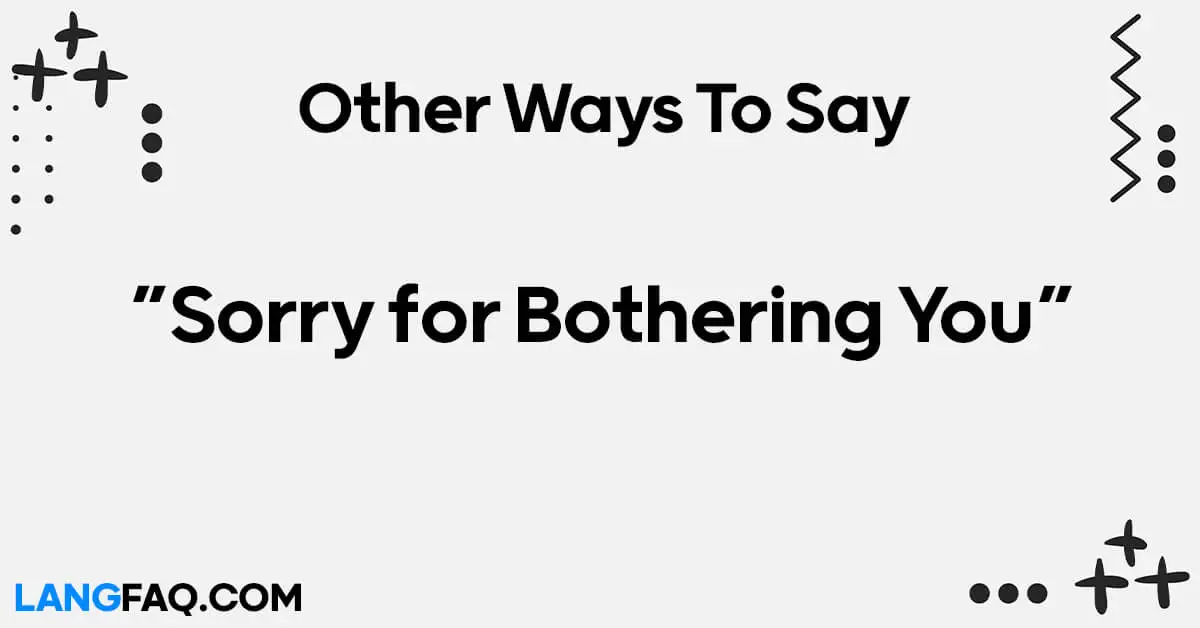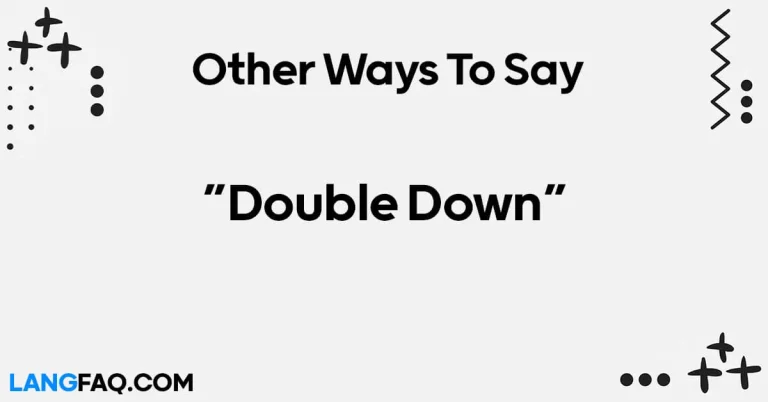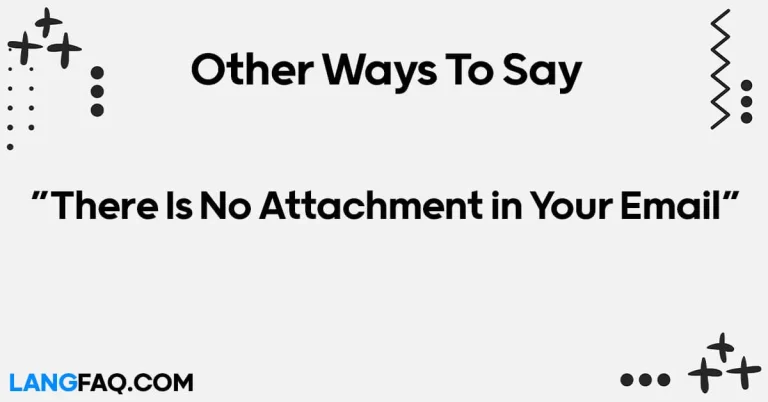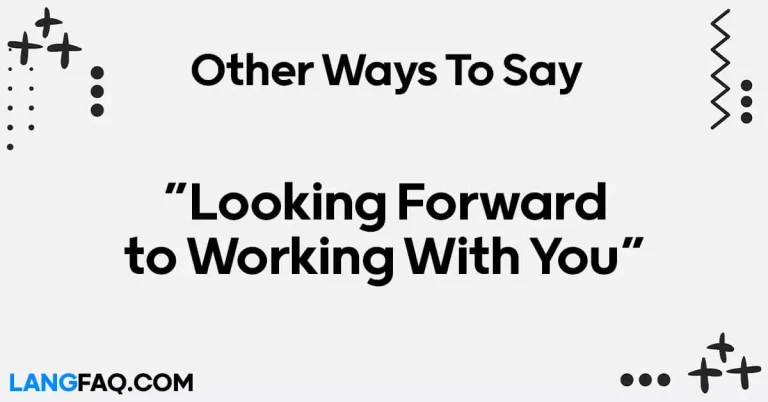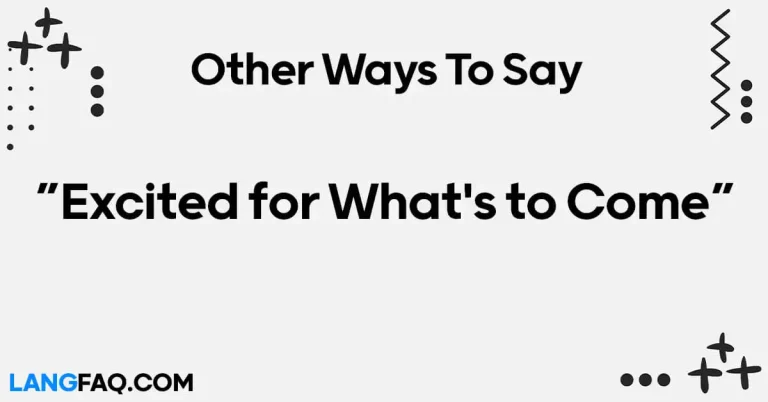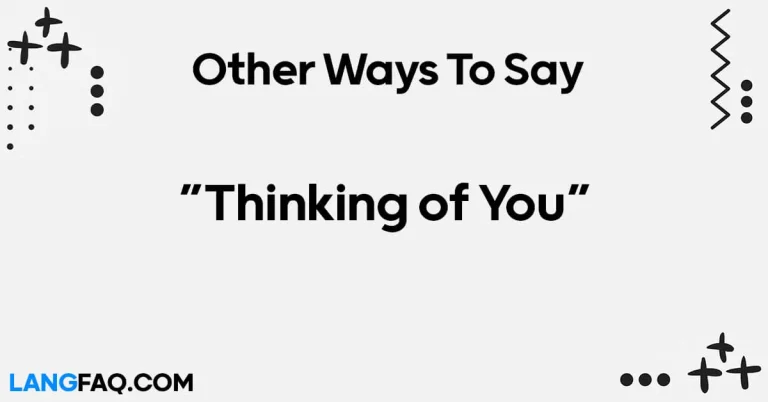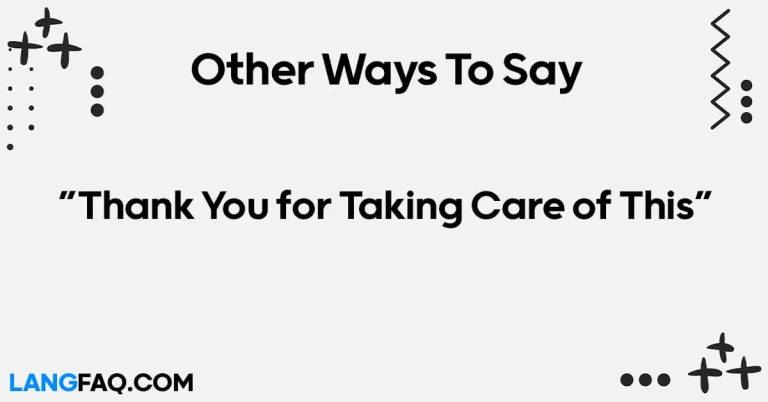Apologizing gracefully is an essential aspect of effective communication. In this comprehensive guide, we explore 12 distinct ways to say “Sorry for Bothering You,” enhancing your conversational finesse. From professional settings to casual encounters, these alternatives ensure you convey politeness with precision.
12 Other Ways to Say “Sorry for Bothering You”
Here are 12 other ways to say “Sorry for Bothering You”:
- Apologies for the interruption.
- I hope I’m not disturbing you.
- Excuse the intrusion.
- Pardon me for taking your time.
- I didn’t mean to disrupt you.
- Please forgive the interruption.
- I’ll make this quick; I know you’re busy.
- I’m sorry to disturb your focus.
- Allow me to apologize for any inconvenience.
- I appreciate your time, and I’m sorry to interrupt.
- I’ll be brief, so I don’t take much of your time.
- Apologies if I caught you at a bad time.
Here’s a table with meanings and examples for the 12 ways to say “Sorry for Bothering You”:
| Expression | Meaning | Example |
|---|---|---|
| Apologies for the interruption | Acknowledging the disruption and expressing regret | “Apologies for the interruption, but I need your quick input.” |
| I hope I’m not disturbing you | Expressing concern about potential disturbance | “I hope I’m not disturbing you, but can I ask a quick question?” |
| Excuse the intrusion | Requesting forgiveness for an unplanned entrance | “Excuse the intrusion, but I have some urgent information.” |
| Pardon me for taking your time | Seeking forgiveness for using someone’s time | “Pardon me for taking your time, but I need your expertise.” |
| I didn’t mean to disrupt you | Clarifying unintentional interruption | “I didn’t mean to disrupt you, but there’s an urgent matter.” |
| Please forgive the interruption | Requesting forgiveness for an unexpected break | “Please forgive the interruption; it won’t take long.” |
| I’ll make this quick; I know you’re busy | Acknowledging the recipient’s busy schedule | “I’ll make this quick; I know you’re busy, but I need advice.” |
| I’m sorry to disturb your focus | Expressing regret for diverting attention | “I’m sorry to disturb your focus, but I have a quick question.” |
| Allow me to apologize for any inconvenience | Offering a general apology for disruption | “Allow me to apologize for any inconvenience I may cause.” |
| I appreciate your time, and I’m sorry to interrupt | Expressing gratitude while apologizing | “I appreciate your time, and I’m sorry to interrupt, but…” |
| I’ll be brief, so I don’t take much of your time | Promising a concise interaction | “I’ll be brief, so I don’t take much of your time, but I need help.” |
| Apologies if I caught you at a bad time | Recognizing the possibility of an inconvenient moment | “Apologies if I caught you at a bad time; we can talk later.” |
Conclusion: Effectively conveying apologies is crucial in maintaining respectful communication. These alternative expressions provide diverse ways to express regret for interruptions, allowing for smoother interactions and fostering positive relationships.
Is It Correct to Say “Sorry for Bothering You”?
Absolutely, it is correct to say “Sorry for Bothering You.” This phrase is a polite and considerate way to acknowledge that you may be causing an interruption or inconvenience to someone. Whether in professional or personal settings, using this expression reflects your awareness and respect for the other person’s time or focus.
When to Use:
- Professional Settings: If you need to ask a colleague a question, interrupt a meeting, or request their attention during work hours.
- Casual Conversations: When you’re aware that someone might be occupied or in the middle of something, even in friendly or informal situations.
Example Usage:
- In a Professional Setting:
- “I apologize; sorry for bothering you, but I urgently need your input on the project deadline.”
- Email Sample: Subject: Urgent Project Input – Sorry for Bothering You “Dear [Recipient’s Name], I hope this email finds you well. Sorry for bothering you, but I require your urgent input on the project deadline. Your assistance is highly appreciated.”
- In a Casual Conversation:
- “I know you’re reading, and I’m sorry for bothering you, but have you seen my keys?”
- Text Message: “Hey! Sorry for bothering you, but have you seen where I left my keys? I can’t find them anywhere.”
Variations:
- “Apologies for the interruption, but…”
- “I hope I’m not disturbing you, but…”
- “Excuse the intrusion, but…”
- “Pardon me for taking your time, but…”
- “I didn’t mean to disrupt you, but…”
Pros and Cons: Pros:
- Politeness: Demonstrates good manners and consideration for the other person’s time.
- Clear Communication: Directly addresses the potential inconvenience caused.
Cons:
- May Sound Formal: In extremely casual situations, it might come across as overly formal.
Grammar/Usage Tips: Ensure you use this phrase sincerely and only when you genuinely feel that your interaction might be an interruption. The key is to convey your apology with authenticity and respect.
Professional Mail Example With “Sorry for Bothering You”
Subject: Urgent Project Input – Sorry for Bothering You
Dear [Recipient’s Name],
I trust this email finds you well. My sincere apologies for bothering you amidst your busy schedule, but I find myself in need of your valuable input on the upcoming project deadline.
I understand the importance of your time, and I wouldn’t disturb you if it weren’t urgent. Your expertise is crucial in ensuring the success of this project, and I am confident that your insights will greatly contribute to its timely completion.
If possible, could we schedule a brief meeting at your earliest convenience? I am more than willing to adapt to your schedule. Alternatively, if you could share your thoughts via email, that would also be immensely helpful.
Once again, I apologize for any disruption this may cause and truly appreciate your understanding and cooperation.
Thank you for your time and consideration.
Best regards,
[Your Full Name] [Your Position] [Your Company] [Your Contact Information]
Apologies for the Interruption
Expressing regret for an interruption is a common courtesy, especially in professional settings. This phrase is versatile and can be adapted to various contexts, demonstrating sincerity and respect for the other person’s time.
Usage: In a formal setting, use this phrase to acknowledge and apologize for any disruption caused by your entrance or request for attention.
Example: Dialogue Snippet: Person A: “Apologies for the interruption, but I have some urgent updates regarding the project.” Person B: “No problem, go ahead.”
Email Sample:
Subject: Apology for the Interruption
Dear [Recipient’s Name],
I hope this message finds you well. I wanted to extend my apologies for the interruption during our meeting earlier today. I appreciate your understanding and would like to provide the necessary updates at your earliest convenience.
Best regards, [Your Name]
Variations:
- “I’m sorry for the interruption, but…”
- “Forgive the interruption, but…”
Pros and Cons: Pros:
- Universally understood as a polite apology.
- Suitable for both formal and semi-formal contexts.
Cons:
- Might sound too formal in casual situations.
Grammar/Usage Tips: Ensure your tone aligns with the formality of the setting. In professional emails, maintain a respectful and concise language.
I Hope I’m Not Disturbing You
This phrase combines politeness with a genuine concern for the other person’s comfort. It’s a subtle way to apologize while seeking permission to continue with your request.
Usage: Appropriate for both formal and informal situations, especially when you’re unsure of the other person’s availability.
Example: Dialogue Snippet: Person A: “I hope I’m not disturbing you, but I have a quick question about the upcoming presentation.” Person B: “Not at all, feel free to ask.”
Email Sample:
Subject: Quick Question – Hope I’m Not Disturbing You
Hi [Recipient’s Name],
I hope this email finds you well. I wanted to ask a brief question about the presentation. I hope I’m not disturbing you; your insights would be greatly appreciated.
Thank you, [Your Name]
Variations:
- “I hope I’m not bothering you, but…”
- “I trust I’m not interrupting, but…”
Pros and Cons: Pros:
- Conveys consideration for the other person’s time.
- Suitable for a wide range of relationships.
Cons:
- Can sometimes be seen as overly cautious.
Grammar/Usage Tips: Use this phrase when initiating communication, ensuring a positive and open dialogue.
Excuse the Intrusion
This phrase introduces an apology with a formal touch, acknowledging that your presence may be unexpected.
Usage: Ideal for formal settings, business emails, or situations where you want to express regret for entering someone’s space.
Example: Dialogue Snippet: Person A: “Excuse the intrusion, but I wanted to discuss the agenda for tomorrow’s meeting.” Person B: “No need to apologize; let’s go over it.”
Email Sample:
Subject: Excuse the Intrusion – Meeting Agenda
Dear [Recipient’s Name],
I hope this email finds you well. Excuse the intrusion, but I’d like to discuss the agenda for our upcoming meeting. Your input is valuable.
Best regards, [Your Name]
Variations:
- “Pardon the intrusion, but…”
- “Excuse me for interrupting, but…”
Pros and Cons: Pros:
- Maintains a high level of formality.
- Creates a sense of politeness.
Cons:
- May sound overly formal in casual environments.
Grammar/Usage Tips: Pair this phrase with a clear and concise reason for your interruption to maintain professionalism.
Pardon Me for Taking Your Time
Acknowledging that you are utilizing someone’s time is a courteous way to express regret. This phrase conveys a sense of respect for the other person’s schedule.
Usage: Perfect for formal occasions, such as business meetings or professional interactions where time is a crucial factor.
Example: Dialogue Snippet: Person A: “Pardon me for taking your time, but I need your approval on these documents.” Person B: “No problem; let me take a look.”
Email Sample:
Subject: Review Request – Pardon Me for Taking Your Time
Dear [Recipient’s Name],
I trust you’re well. Pardon me for taking your time, but I’d appreciate your review and approval of the attached documents at your earliest convenience.
Thank you, [Your Name]
Variations:
- “Forgive me for using your time, but…”
- “I apologize for the time I’m taking, but…”
Pros and Cons: Pros:
- Shows consideration for the value of the other person’s time.
- Adds a touch of formality to the apology.
Cons:
- May sound too formal in casual conversations.
Grammar/Usage Tips: Ensure that your reason for using their time is clearly stated to avoid ambiguity and showcase professionalism.
I Didn’t Mean to Disrupt You
This phrase is straightforward and sincere, expressing your intention not to cause any disruption while seeking the other person’s understanding.
Usage: Suitable for both formal and informal settings, emphasizing honesty and transparency.
Example: Dialogue Snippet: Person A: “I didn’t mean to disrupt you, but I have a quick question about the project.” Person B: “No disruption at all; feel free to ask.”
Email Sample:
Subject: Clarification – I Didn’t Mean to Disrupt You
Hi [Recipient’s Name],
I hope you’re doing well. I wanted to clarify a point from our last discussion. I didn’t mean to disrupt you, but I believe clarity on this matter is crucial. Your insights would be valuable.
Best regards, [Your Name]
Variations:
- “My intention wasn’t to disturb you, but…”
- “I hope I haven’t caused any disruption, but…”
Pros and Cons: Pros:
- Demonstrates honesty and transparency.
- Versatile and suitable for various relationships.
Cons:
- May sound too casual for extremely formal environments.
Grammar/Usage Tips: Use this phrase when you want to convey a genuine apology without excessive formality.
Please Forgive the Interruption
This phrase combines politeness with a direct request for forgiveness, making it suitable for situations where a sincere apology is warranted.
Usage: Appropriate for both formal and semi-formal contexts, conveying respect for the other person’s time.
Example: Dialogue Snippet: Person A: “Please forgive the interruption, but I need your input on the upcoming presentation.” Person B: “No need for forgiveness; let’s discuss it.”
Email Sample:
Subject: Seeking Forgiveness – Please Forgive the Interruption
Dear [Recipient’s Name],
I trust this message finds you well. Please forgive the interruption, but I require your valuable input on the upcoming presentation. Your insights are greatly appreciated.
Thank you, [Your Name]
Variations:
- “I seek your forgiveness for the interruption, but…”
- “Forgive me for disrupting you, but…”
Pros and Cons: Pros:
- Blends formality with a direct request for forgiveness.
- Conveys sincerity in the apology.
Cons:
- May sound too formal for casual conversations.
Grammar/Usage Tips: Use this phrase when you want to emphasize the need for forgiveness while maintaining a respectful tone.
I’ll Make This Quick; I Know You’re Busy
Acknowledging the other person’s busy schedule is a considerate way to express your apology. This phrase sets the expectation for a brief interaction.
Usage: Perfect for professional settings where time is of the essence, and acknowledging the other person’s workload is crucial.
Example: Dialogue Snippet: Person A: “I’ll make this quick; I know you’re busy, but I need your signature on these documents.” Person B: “Thank you for being mindful of my schedule. Go ahead.”
Email Sample:
Subject: Quick Request – I’ll Make This Quick; I Know You’re Busy
Hi [Recipient’s Name],
I hope your day is going well. I’ll make this quick; I know you’re busy. I need your approval on the attached documents. Your prompt attention is highly appreciated.
Best regards, [Your Name]
Variations:
- “I’ll be brief; I understand you’re busy, but…”
- “Mindful of your schedule, I’ll make this quick by asking…”
Pros and Cons: Pros:
- Demonstrates awareness of the other person’s time constraints.
- Creates a sense of efficiency in the interaction.
Cons:
- May sound too formal for casual conversations.
Grammar/Usage Tips: Pair this phrase with a clear and concise explanation of your request to maintain professionalism.
I’m Sorry to Disturb Your Focus
Expressing regret for disrupting someone’s focus acknowledges their concentration while seeking permission to engage briefly.
Usage: Ideal for professional settings or when interrupting someone engrossed in a task, emphasizing your awareness of their concentration.
Example: Dialogue Snippet: Person A: “I’m sorry to disturb your focus, but I have a question regarding the project deadline.” Person B: “No worries. I can spare a moment. What’s your question?”
Email Sample:
Subject: Regretful Disturbance – I’m Sorry to Disturb Your Focus
Dear [Recipient’s Name],
I trust you’re well. I’m sorry to disturb your focus, but I require clarification on the project deadline. Your guidance is appreciated.
Thank you, [Your Name]
Variations:
- “Apologies for disrupting your focus, but…”
- “I apologize if I’m interrupting your concentration, but…”
Pros and Cons: Pros:
- Shows consideration for the other person’s concentration.
- Appropriate for both formal and semi-formal contexts.
Cons:
- May sound too formal for casual environments.
Grammar/Usage Tips: Use this phrase when you want to convey regret for interrupting someone’s concentration, ensuring a positive response.
Allow Me to Apologize for Any Inconvenience
This phrase combines a formal apology with an expression of regret for any inconvenience caused, suitable for various professional contexts.
Usage: Best used in formal settings or when you want to convey a sincere apology while leaving room for the other person to respond.
Example: Dialogue Snippet: Person A: “Allow me to apologize for any inconvenience caused by the change in the meeting schedule.” Person B: “I appreciate your apology. Let me know the new details.”
Email Sample:
Subject: Apology and Schedule Change – Allow Me to Apologize for Any Inconvenience
Dear [Recipient’s Name],
I hope this email finds you well. Allow me to apologize for any inconvenience caused by the recent change in the meeting schedule. Your understanding is valued.
Thank you, [Your Name]
Variations:
- “I’d like to apologize for any inconvenience, but…”
- “Please allow me to express my regret for any inconvenience caused by…”
Pros and Cons: Pros:
- Conveys a formal and sincere apology.
- Leaves room for the other person to respond.
Cons:
- May sound overly formal in casual conversations.
Grammar/Usage Tips: Use this phrase when you want to express sincere regret and convey professionalism in your apology.
I Appreciate Your Time, and I’m Sorry to Interrupt
Combining gratitude with an apology, this phrase acknowledges the value of the other person’s time while expressing regret for the interruption.
Usage: Suitable for both professional and personal contexts, emphasizing respect for the other person’s time.
Example: Dialogue Snippet: Person A: “I appreciate your time, and I’m sorry to interrupt, but I need your input on the upcoming project.” Person B: “Your appreciation is noted. Feel free to share your thoughts.”
Email Sample:
Subject: Seeking Input – I Appreciate Your Time, and I’m Sorry to Interrupt
Hi [Recipient’s Name],
I trust you’re doing well. I appreciate your time, and I’m sorry to interrupt. I’m seeking your valuable input on the upcoming project. Your expertise is highly regarded.
Best regards, [Your Name]
Variations:
- “Thank you for your time, and I’m sorry to interrupt, but…”
- “Your time is valuable, and I apologize for the interruption, but…”
Pros and Cons: Pros:
- Demonstrates appreciation and respect.
- Suitable for various relationships and settings.
Cons:
- May sound overly formal in casual conversations.
Grammar/Usage Tips: Use this phrase when you want to convey both gratitude and regret, maintaining a balanced and polite tone.
I’ll Be Brief; I Know You’re Busy
Similar to acknowledging busyness, this phrase assures the other person of a concise interaction, respecting their time constraints.
Usage: Ideal for professional environments, particularly when you want to convey efficiency and awareness of the other person’s workload.
Example: Dialogue Snippet: Person A: “I’ll be brief; I know you’re busy, but I need your approval on these budget revisions.” Person B: “Your efficiency is appreciated. Go ahead.”
Email Sample:
Subject: Urgent Approval Needed – I’ll Be Brief; I Know You’re Busy
Dear [Recipient’s Name],
I hope this message finds you well. I’ll be brief; I know you’re busy, but I require your prompt approval on the budget revisions attached. Your swift attention is invaluable.
Thank you, [Your Name]
Variations:
- “Let me be brief; I understand you’re busy, but…”
- “I’ll keep it short; I know you have a busy schedule, but…”
Pros and Cons: Pros:
- Conveys efficiency and awareness of the other person’s time.
- Suitable for professional environments.
Cons:
- May sound too formal in casual conversations.
Grammar/Usage Tips: Use this phrase when you want to assure the other person of a quick interaction while maintaining professionalism.
Apologies If I Caught You at a Bad Time
This phrase acknowledges the possibility of inconvenience, showing consideration for the other person’s current situation.
Usage: Versatile and suitable for various situations, particularly when you want to express regret for potential inconvenience.
Example: Dialogue Snippet: Person A: “Apologies if I caught you at a bad time, but I have a question about the upcoming event.” Person B: “No problem at all. What do you need?”
Email Sample:
Subject: Inquiry – Apologies If I Caught You at a Bad Time
Hi [Recipient’s Name],
I hope this email doesn’t inconvenience you. Apologies if I caught you at a bad time. I have a quick question about the upcoming event.
Best regards, [Your Name]
Variations:
- “I’m sorry if now is not a good time, but…”
- “Apologies for any inconvenience; let me know if it’s a bad time, but…”
Pros and Cons: Pros:
- Demonstrates consideration for the other person’s schedule.
- Appropriate for various relationships and settings.
Cons:
- May sound too formal in casual conversations.
Grammar/Usage Tips: Use this phrase when you want to convey flexibility and apologize for a potential disruption, maintaining a polite tone.
FAQs:
How can I apologize professionally in a work setting? In professional settings, maintain a formal tone. Acknowledge the interruption, express regret, and assure them of your respect for their time.
Is humor appropriate in an apology? Humor can be effective if used tastefully. Ensure it aligns with the context and doesn’t trivialize the situation.
Should I apologize differently in virtual meetings? Yes, digital apologies require a unique approach. Be concise, acknowledge the interruption, and express your apologies clearly.
How do I apologize without assigning blame? Focus on your actions rather than attributing blame. Acknowledge the inconvenience caused and express a genuine desire to rectify the situation.
Are non-verbal apologies effective? Non-verbal apologies can be powerful. A sincere gesture or a respectful pause can convey regret effectively.
How can I turn a mistake into a learning opportunity? Acknowledge the mistake, outline steps for improvement, and express your commitment to avoiding similar disruptions in the future.
Conclusion:
Mastering the art of apologizing enhances your interpersonal skills. These 12 alternative ways to say “Sorry for Bothering You” provide a toolkit for navigating various scenarios with grace. Remember, a well-phrased apology not only mends relationships but also showcases your professionalism and consideration.

